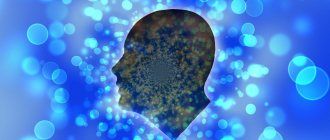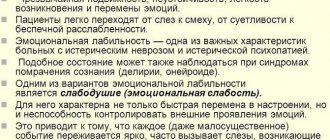Personality category in psychology
Man is a being who embodies the highest stage of development of life on Earth, a subject of socio-historical activity
.
An individual (according to A.N. Leontyev) is a person as a representative of a certain species of homo sapiens; a single natural being, a living individual as a representative of its species, as a bearer of individually unique traits, as a subject of its own life activity.
The concept of an individual expresses at least two main features:
1) indivisibility, or integrity, of the subject;
2) the presence of special – individual – properties that distinguish it from other representatives of the same species. Man (and animal) is born an individual. It has its own genotype - characteristics determined by nature.
Individuality (from Latin individuum -
indivisible, individual) –
originality, uniqueness of human properties
.
Personality is a special systemic mental new formation of an individual, generated by the process of human life in society and manifested in self-determination and self-regulation of activity based on the hierarchy of motives and self-awareness.
So, each of us is a person, an individual who has certain individual properties (features of physique, appearance, temperament, character), a subject of his own life activity. But is everyone a person? Let us turn to the analysis of the main criteria for personality development, which were proposed by A.N. Leontyev:
1) the presence of a hierarchy of motives - a person’s ability to subordinate some motives to others: personal motives - socially significant (but a person cannot always realize, understand why he acted in one way or another, why he obeyed a moral motive - “spontaneous morality”);
2) a person’s ability to realize his own motives - motives and, on this basis, consciously manage them. This is possible thanks to such an instance of personality as self-awareness.
A.N. Leontyev said that “one is not born (not born) as a person, one becomes a person.” He distinguished two periods, or births, of personality: preschool age and adolescence.
Mechanisms of personality formation:
1. The mechanism of shifting the motive to the goal.
From early childhood, a child is surrounded by many norms, restrictions, and rules of behavior (“You can’t eat with your hands,” “You need to say hello,” “Don’t offend the little ones,” etc.). As a result, the child learns these norms and generally tries to behave in accordance with them. But is this normal child training? Or is he undergoing some internal changes and should we talk about such changes as personal changes?
The child also experiences internal changes in his motives - moral motives become really effective. Now let's see how this happens. Let's imagine a child who really wants to communicate with his mother and have a kind, affectionate relationship with her. But his mother demands that he behave “decently” and follow certain rules of behavior. It is important that the mother kindly puts forward her demands on the child. Child for the sake of communication with mother ( motive
), for example, stops fighting with a brother or sister (
target
). Gradually, thanks to positive communication with the mother, which to some extent serves as reinforcement of the child’s correct action, the desire not to fight (goal) becomes an independent motive, i.e. the goal has become a motive. It is very important that a positive relationship develops between the child and his parent, otherwise this mechanism will not work.
The mechanism of shifting a motive to a goal is one of the mechanisms for the formation of new motives and “works” throughout a person’s life (for example, studying, reading a book, doing some kind of work).
2. Identification mechanism.
Adults not only purposefully convey to the child certain norms, values, and rules of behavior; the child learns much of this himself, imitating adults. First, the child is identified with his parents, then with other significant adults and peers. Identification can also be with some hero - historical, literary, film hero. Throughout their development, a child, teenager, young man has a certain model, an ideal to follow. Role models may change, some of them devalued.
3. The mechanism of accepting and mastering social roles.
Each of us fulfills a variety of social roles - man or woman, son or daughter, student, sports team member, passenger, etc. We assigned many of these roles in childhood. In the course of such mastery and fulfillment of roles, new motives are formed, their subordination occurs, our views, values, and priorities change; That is why this mechanism is called the mechanism of personality formation.
The role we perform gives us new motives. Further, when performing one or another role, we have to subordinate our own motives in a certain way, for example, a doctor or a military man, risking his life, provides assistance in a combat zone, a teacher spends time preparing interesting material for students, instead of studying some other activity or hobby.
Personality structure
In modern Russian psychology, the following understanding of personality structure is accepted:
1) need-motivational sphere;
2) emotional-volitional sphere;
3) the sphere of self-awareness.
The need-motivational sphere includes a system of motivational formations of the individual - needs, motives, interests, values, ideals. This complex of motivational formations constitutes the orientation of the individual. If we talk specifically about motives and needs in the context of the individual (and not the individual, since the individual also has needs and motives), then it is necessary to highlight, first of all, the hierarchy of motives and the presence of moral and social motives as real motivators of human activity.
The emotional-volitional sphere includes emotional and volitional processes and regulates motives. Volitional efforts are always necessary where a person tries to regulate his system of motives, especially in a situation of “conflict of motives.”
Self-awareness (I-concept) –
relatively stable, more or less conscious, experienced as a unique system of a person’s ideas about himself.
CONFORMAL CHARACTER
Even good qualifications do not help an employee with a conformist character master the skills of independent work.
People endowed with such a character can act only if they find support from others. Without such support, they are lost and do not know what to do, what is right in a particular situation and what is wrong. A feature of people of a conformist nature is the absence of contradictions with their environment. Finding a place in it, they easily feel the “average” opinion of others, are easily impressed by the most common judgments and easily follow them. They cannot resist the pressure of persuasive influences; they immediately give in.
Persons of a conformist character cement the team, as it were. Invisible, never coming to the fore, they are natural carriers of his norms, values, and interests. One of the undoubted advantages of this type of character is gentleness in communication, natural “guidance”, the ability to “dissolve” oneself in the values and interests of another.
The disadvantages of conformity are related to its advantages. Easily obeying others, such a person often does not have his own opinion. If the opinion of others on a particular issue has changed, he blindly follows it, without critically comparing it with the previous one. Even if a person of a conformist character has the knowledge to make the right conclusions himself, he most often follows his environment, discarding his weakly manifested “guessings.” At best, he timidly tries to express them, but if they do not find support from those around him, he gives up.
Whether this is expressed explicitly or not, the internal, deeply felt rules of such a person are: “be like everyone else,” “don’t get ahead of yourself,” “keep up.” Such people seem to set their goal to be in the shadows all the time, in the golden mean. Avoid bold, challenging actions. Falling into dependence on the opinions, assessments, and views of others and thus forming their worldview, they are conservative and do not want to change the environment, as this is fraught with a revision of their views. Such people rarely change their place of work, and even if the existing relationship is inconvenient for them, they usually endure it patiently.
Workers of a conforming nature can be good deputies (assistants), moving up the career ladder in this role. But they should not be made “bosses” or entrusted with organizing the business independently. In this case, the person will most likely become confused and may come to the point where, looking for a way out, he will obey his subordinate.
Conditions are more favorable for such persons when activities are well regulated. They must clearly know: what needs to be done, in what time frame, in what sequence. If you have such a person under your command, you must clearly explain your requirements to him and consistently guide him. In this case, his activity will become more productive, more lively.
You can overcome the traits of excessive conformism by training your will. Strive to express and express your inner position in behavior, defend it, develop strength of character.
Formation of human character
What factors will influence character traits:
- genetic predisposition - there is an opinion that some traits are inherited from our parents;
- society - parents and other significant adults (relatives, neighbors, teachers), friends, classmates;
- life circumstances are situations that a child faces. For example, the financial situation of the family, events of various modalities also influence the future character. If the same child experiences the death of a loved one or, conversely, something bright and positive, these two factors will leave different imprints on his personality.
Initially, the baby looks at how his parents treat him. Further, it is with this attitude that he will go into the big world. That is, if he was loved, surrounded with warmth and care, talked about his value, then this is exactly how he will feel among others - significant, important, valuable. This is how he will treat people. And vice versa.










